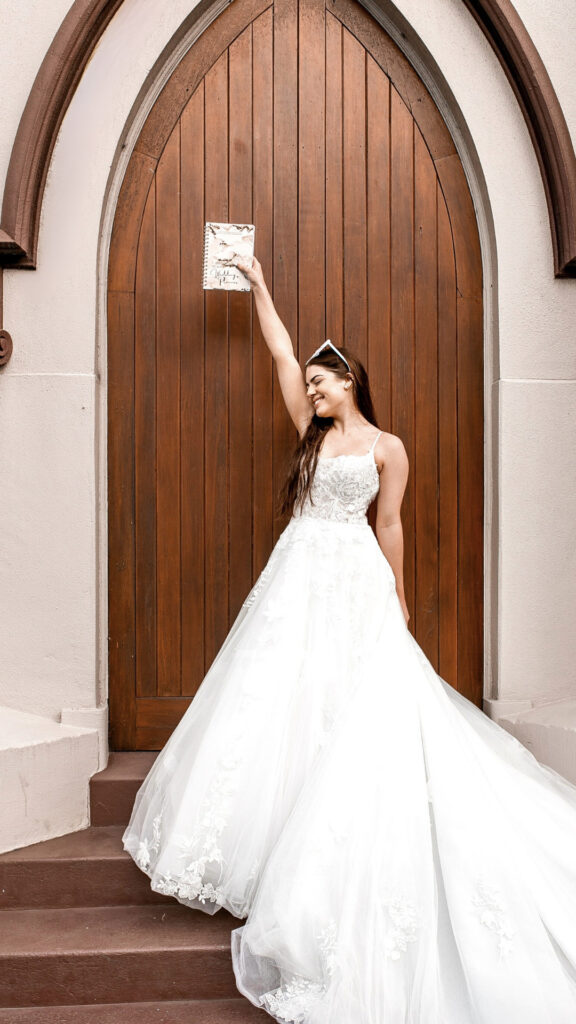Your cart is currently empty!
Your Ultimate Wedding Planning Q&A Guide
Just get engaged?
Congratulations!!! This is such an exciting time, and we know you probably have a lot of questions about where to start. Planning a wedding can feel overwhelming, but don’t worry – we’ve got you covered. Whether you’re wondering when to book vendors, how to budget, or how long you should take to plan, we’re here to help make the process smoother and more enjoyable.
In this blog, we’ve compiled answers to some of the most common questions newly engaged couples ask when they’re beginning their wedding journey. From timeline tips to budget-friendly ideas and everything in between, this guide will help you feel confident as you take the first steps toward your big day. Let’s dive in and get planning!
Wedding Planning Basics:
Q1: What is the first thing to do after getting engaged?
Once the excitement of the engagement has settled, there are a few key things to tackle first:
- Set a wedding date (or at least a rough month and year).
- Discuss your vision for the big day with your partner. Will it be a large, formal affair or an intimate gathering?
- Set a budget that you both agree upon. This is crucial for every decision moving forward.
Q2: How long does it take to plan a wedding?
Typically, couples spend 12 to 18 months planning a wedding. Planning within this window gives you time to book the vendors you want, without too much stress. However, if you’re planning a shorter engagement, it’s absolutely doable — just be prepared for tighter deadlines and less time to save. Ideally, you should start locking in your vendors around 12 months out, as too much time before that could mean changes to dates or other plans. Conversely, starting too late may leave you with limited options for venues and vendors.
Q3: When should you book wedding vendors (venue, photographer, florist, etc.)?
Here’s a general guide on when to book key vendors:
- 12+ months out: Wedding venue
- 10-12 months out: Photographer
- 8-10 months out: Florist
- For a more detailed guidance, check out our 12-month wedding planning checklist available in our I Do Diary wedding planner or digital PDF!
Q4: What are the steps to planning a wedding?
The key phases of wedding planning include:
- Announce your engagement – Celebrate the moment with loved ones!
- Set a budget – This will guide most of your decisions.
- Secure a date and venue – These are the foundation of your wedding day.
- Lock in vendors – Prioritise big-ticket vendors like photographers and florists.
- Send invitations – Aim for around 6-8 months before the wedding.
- Plan the details – Décor, seating arrangements, and other fun elements!
Budget and Costs:
Q5: How much does the average wedding cost?
In New Zealand, the average wedding costs approximately $35,000 NZD according to The Little Hire Company. In Australia, the average wedding cost is around $33,810 AUD according to Easy Weddings. Of course, costs will vary based on your location and the scale of your wedding.
Q6: How to plan a wedding budget?
To map out your wedding budget, start by assessing your current savings and any contributions from family. For example, if you plan to spend $40,000 on your wedding and have 12 months to save, and you already have $5,000 saved with a $5,000 family contribution, you’ll need to save $2,500 per month. Based on your income, figure out how much each of you can contribute weekly and look for ways to cut non-essential costs in your daily lives.
Q7: How much should I spend on a wedding venue?
The wedding venue typically accounts for about 30-40% of your total budget. This will vary depending on the type of venue you choose (outdoor, indoor, luxury, casual) and what’s included (such as catering and décor).
Q8: How much should we budget for food and drink at a wedding?
Food and drink often account for another 30-40% of your wedding budget. In New Zealand, this can range between $90 to $150 per person depending on the type of catering (sit-down meal, buffet, etc.). To calculate, multiply your estimated number of guests by the per-person cost. For example, if your budget for food is $15,000 and each guest costs $150, you can invite 100 people. If this doesn’t fit your guest list, consider more affordable options like buffet-style meals or even a “bring a plate” style of event for a more casual vibe.
Q9: How much should we spend on wedding photography?
Wedding photography is often one of the most cherished investments. Packages can vary from basic coverage (2-4 hours) to full-day coverage (8-12 hours). Prices typically range from $3,000to $5,000. Since these photos will be your lasting memory of the day, it’s worth allocating a decent portion of your budget to this.
Wedding Inspiration and Ideas:
Q10: What are some unique wedding ideas?
Looking to make your wedding stand out? Consider these unique ideas:
- Heart-shaped sunglasses for fun photos with your guests.
- Alternative guest books like audio recordings or a photo booth guest book.
- Caravan bars and signature cocktails for a personal touch.
- Behind-the-scenes content creators who capture candid moments throughout your day.
Q11: What are the latest wedding trends?
In 2024, we’re seeing trends like bold colour palettes, unique guest experiences (like live entertainment or mobile food trucks), and minimalist décor with natural elements. Eco-friendly weddings are also gaining popularity, with couples opting for sustainable practices in food, confetti, décor, and even attire.
Q12: How to plan a DIY wedding?
Here are three simple ideas to add a DIY touch to your big day:
- Table centerpieces – Try making your own floral arrangements, tablecloths or use lanterns and candles for an elegant look.
- Signage – Create your own welcome signs or seating charts using printable designs or decals.
- Wedding favours – Consider homemade candles, jams, or personalised keepsakes.
Q13: How to choose a wedding theme?
Your theme should reflect your personalities and style. Brainstorm ideas in your I Do Diary and print out images for inspiration. You can also create a Pinterest board with your favorite dress styles, colour palettes, and décor ideas to help refine your vision. Check out our I Do Inspiration page – and instantly download any themes/ideas that you want to save for later!
Logistics and Tips:
Q14: What’s the best time of year to get married?
Each season has its pros and cons:
- Spring: Beautiful blooms and mild weather, but potentially higher costs due to popularity.
- Summer: Ideal for outdoor weddings, but beware of heat and limited availability.
- Autumn: Stunning natural colors, and often lower costs. Chance of rain increases.
- Winter: Cozy indoor weddings, often the most budget-friendly option. Snowy photoshoot!
Q15: How to choose the perfect wedding venue?
Consider these factors:
- Location: Is it easy for your guests to travel to?
- Capacity: Does it comfortably fit your guest list?
- Style: Does it match your wedding theme?
Q16: How to create a wedding timeline?
For a smooth day, create a detailed timeline. Here’s an example:
- 9:00 AM: Hair and makeup
- 2:00 PM: Ceremony
- 4:00 PM: Reception begins
- Note: Be sure to allow buffer time between key events for photos and unexpected delays. Download your digital PDF if you want access to our digital timeline!
Q17: How do we manage our guest list?
Start with a rough list of everyone you want to invite. If your venue has limitations or your budget is tight, prioritise your guest list by family and close friends, then work your way down.
Other Common Questions:
Q18: How many bridesmaids should I have?
There’s no “right” number — it depends on your personal preference, your budget, and the size of your wedding. A smaller wedding might only need a few bridesmaids, while a larger celebration could include more. Remember – the larger the bridal party, the larger the pricetag.
Q19: What are the different types of wedding ceremonies?
There are various types of ceremonies to consider:
- Religious: Based on your faith or cultural traditions. Often uses a Priest/minister.
- Secular: A non-religious ceremony that focuses on personal vows. Must be ‘officiated’ by a registered celebrant.
- Symbolic: Some couples choose symbolic ceremonies, like a unity candle or sand ceremony.
Q20: How to send out wedding invitations?
Send out invitations around 6-8 months before the wedding. Make sure to include RSVP information and any details about the dress code, travel, or accommodations. You can also send digital invites & receive virtual RSVP’s for a modern, eco-friendly option.
Q21: When should we go dress shopping?
Start shopping around for your wedding dress 8-12 months before your big day as you don’t want to be rushed into a decision. Custom dresses or major alterations can take time, so it’s best to begin early. Ideally, finalise your dress choice around 6 months before the wedding. Then, after alterations, aim to pick up the dress 1-3 months before your wedding to ensure the fit is perfect and measurements are accurate.
Final Thoughts:
Planning a wedding is a big journey, but by tackling each step methodically, you’ll feel more organised and confident as you approach your big day. For more tips and tools to help you plan your wedding, check out our I Do Diary wedding planner, which includes everything you need to stay on track from engagement to “I do.”


